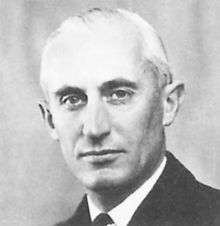Robert Sherbrooke
Rear-Admiral Robert St Vincent Sherbrooke, VC, CB, DSO, DL (8 January 1901 – 13 June 1972) was a senior officer in the Royal Navy and an English recipient of the Victoria Cross, the highest award for gallantry in the face of the enemy that can be awarded to British and Commonwealth forces.
Robert St Vincent Sherbrooke | |
|---|---|
 | |
| Nickname(s) | Rupert |
| Born | 8 January 1901 Oxton, Nottinghamshire |
| Died | 13 June 1972 (aged 71) Oxton, Nottinghamshire |
| Buried | St Peter and St Paul's churchyard, Oxton |
| Allegiance | United Kingdom |
| Service/ | Royal Navy |
| Years of service | 1917–1954 |
| Rank | Rear-Admiral |
| Commands held | Flag Officer Germany (1951–53) HMS Daedalus III (1948–49) HMS Aurora (1945–46) HMS Condor (1943) HMS Onslow (1942–43) HMS Matabele (1940–41) HMS Cossack (1939–40) HMS Wakeful (1939) |
| Battles/wars | First World War Second World War |
| Awards | Victoria Cross Companion of the Order of the Bath Distinguished Service Order King Haakon VII Freedom Cross (Norway) |
| Spouse(s) | Rosemary Neville Buckley (1903-1998) m.1929 |
| Children | Dione Digby, Lady Digby b.1934 |
| Other work | Lord Lieutenant of Nottinghamshire |
Background
Born in Oxton, Nottinghamshire, Sherbrooke attended the Royal Naval Colleges of Osborne and Dartmouth and joined the Royal Navy in 1917 as a midshipman aboard HMS Canada. He was promoted to commander in 1935 and served aboard the aircraft carrier HMS Courageous. His wartime commands were all destroyers.
VC action
Sherbrooke was 41 years old, and a captain in the Royal Navy during the Second World War when the following deed took place during the Battle of the Barents Sea for which he was awarded the VC.
On 31 December 1942 off North Cape, Norway, in the Barents Sea, Captain Sherbrooke in HMS Onslow was senior officer in command of destroyers escorting an important convoy for North Russia, when he made contact with a vastly superior enemy force—the cruiser Hipper and the pocket battleship Lutzow. Four times the enemy tried to attack the convoy but was forced back each time. Early in the action Captain Sherbrooke was seriously wounded in the face and temporarily blinded. Nevertheless, he continued to direct the ships under his command and even when the next senior officer had assumed control, he insisted on receiving all reports of the action until the convoy was out of danger. His actions—and the German ships' failure to neutralize the convoy despite its superior force—were pivotal in Hitler's order to end the use of surface fleet of the Kriegsmarine at the beginning of 1943.[1]
Later life
From July 1945 to mid-1946 Sherbrooke was CO cruiser HMS Aurora. He later achieved the rank of rear-admiral.
He was appointed High Sheriff of Nottinghamshire for 1958–59.[2] His daughter is Dione Digby, Lady Digby.
He died in his home town of Oxton, aged 71.
References
- "No. 35859". The London Gazette (Supplement). 8 January 1943. pp. 283–284.
- "No. 41340". The London Gazette. 18 March 1958. p. 1779.
External links
- Captain R.S.V. Sherbrooke in The Art of War exhibition at the UK National Archives
- Rear-Admiral Robert St. Vincent Sherbrooke (brief biography)
- Location of grave and VC medal (Nottinghamshire)
- Royal Navy Officers 1939–1945